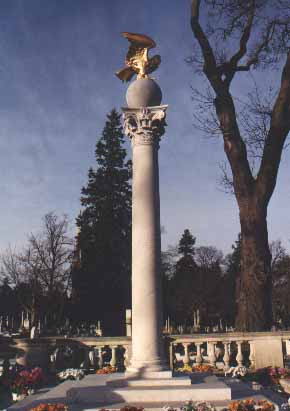Throughout those years, Shoghi Effendi educated the Bahá'í
community about the administrative order of the Faith and prepared it for
the eventual establishment of that order's other central institution by
writing consistently about the interconnection of the Guardianship and
the Universal House of Justice, both of which he described
as "divine in origin, essential in their functions and complementary
in their aim and purpose." He continued on to state that
their common purpose is "to insure the continuity of that divinely-appointed
authority which flows from the Source of our Faith, to safeguard the unity
of its followers and to maintain the integrity and flexibility of its teachings."
The institution of the Guardianship is Bahá'u'lláh's means
for providing for the continuation of the unerring interpretation of His
word. The function of the Universal House of Justice, on the other hand,
is to legislate upon matters "not expressly revealed in the Sacred Texts."
As Shoghi Effendi said, "Acting in conjunction with each other these
two inseparable institutions administer [the Bahá'í Faith's]
affairs, coordinate its activities, promote its interests, execute its
laws and defend its subsidiary institutions."
The interconnection of the Guardianship and the Universal House of Justice
is further evidenced by the Guardian's ceaseless labor to foster the expansion
of the Bahá'í community around the world in order to establish
and develop the national legislative bodies of the administrative order;
the goal of this work was the election of the
Universal House of Justice and the full development in all aspects
of the order ordained by Bahá'u'lláh.
He safeguarded the unity of the Faith by acting, as `Abdu'l-Bahá
before him had acted, as the authoritative interpreter and expounder of
the Bahá'í sacred writings. All questions regarding interpretation
were to be directed to him. Although he did not have the authority to alter
in any way what Bahá'u'lláh or `Abdu'l-Bahá had revealed,
he performed the crucial tasks of clarifying points which may not have
been clearly understood and of elaborating upon previously revealed teachings.
To this end, he wrote thousands of letters to individual believers and
to Bahá'í communities around the world. Through such guidance,
the Bahá'ís remained unified in their clear understanding
of the Faith's sacred writings.
Shoghi Effendi translated the Bahá'í writings from the
language in which they were revealed -- either Persian or Arabic -- into
a majestic style of English. In 1921, relatively few of Bahá'u'lláh's
extensive writings were available in English. The Guardian translated Bahá'u'lláh's
central works and compiled them so the Bahá'ís would have
access to authoritative translations, and he published, under the title
of The Dawn-Breakers, his annotated and edited translation of the main
historical account of the early years of the Bahá'í Faith
by Nabíl-i-A`zam so the English-speaking Bahá'ís would
be able to gain inspiration from the examples of their spiritual forebears
and to read eye-witness accounts of those who met the Báb and Bahá'u'lláh.
Shoghi Effendi also penned his own historical account of the first century
of the Bahá'í Faith called God Passes By.
 Shoghi Effendi's resting place near London, England
Shoghi Effendi's resting place near London, England
To read more on the Universal
House of Justice (also click here)
Return to top

